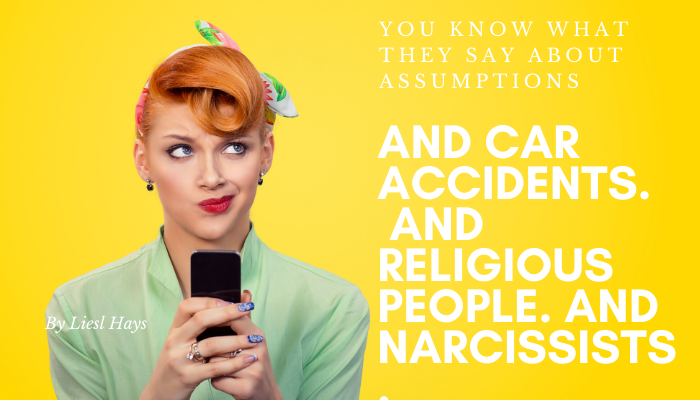I got hit at a stop sign once.
Someone cut the corner and ran into the front of my car.
As you can imagine, I was in complete shock at the scene of the accident.
Luckily, no one got hurt during this fender bender.
The guy who hit me was extremely apologetic and said he didn’t see me at all.
I made the assumption he realized the accident was 100% his fault (mistake one). After all, I was leisurely parked at the stop signed when he ran into me.
Instead of calling the police, we exchanged insurance information and went about our day (mistake two).
My therapist says one of the biggest relationship errors we make is ASSUMING.
As humans, we’ve perfected the art of making assumptions.
Assumptions fracture our relationships.
Assumptions sound like this: Well, I assumed he was taking 100% of the blame for this accident. I assumed my husband heard me tell the kiddos how tired I was. I assumed she would double check the data in that report.
My assumptions were about to get me in big trouble.
What ensued after the car wreck were hurt feelings and anger.
The guy made a statement to the insurance adjuster he believed my vehicle was moving.
The adjuster assigned 90% of the blame to him and 10% of the blame to me. I was pissed.
I was mad for a solid two days and it consumed me.
I felt blind-sided by this new data I felt wasn’t shared at the accident scene.
So I naturally did what the viciously scorned do: I google stalked him. I found out he was a Christian author which only added to my rage. It re-enforced so many stereotypes I had about religious people.
I seethed and constructed a well-crafted argument if I ever ran into him.
Then, I thought about a quote from my grandfather’s eulogy that went something like this, “When you’re angry with someone else and making assumptions, it would be wise to understand what they might be assuming about you.”
This is a powerful quote my sister reminds me of regularly when I’m making assumptions. It usually annoys the shit out of me because I know she’s right. This quote sounds so gentle coming from my grandfather though (he was a legit human) and forces me to re-consider regularly.
I switched gears.
Instead of spending my time stewing in anger, I took a hard look at myself:
“What was the universe trying to teach me through this critical moment? How was I supposed to grow to be a better person? What assumptions was the driver making about me?”
How many times in life have we impeded our own growth by holding onto 10% of our pride?
I was mad and angry over 10% of the blame.
To move forward, I had to let go of that 10% and ask what I was supposed to learn from this situation.
Here’s what I gathered:
Step One: Challenge your assumptions
You’re human so it isn’t a matter of if- it’s a matter of when you’ll make your next assumption. Assumptions are dangerous and they prevent us from having healthy relationships with others. Instead of developing a series of false assumptions in your head, challenge them.
I typically start with thoughtful questions: What might this person be assuming about me? What core values has this person violated that triggered my anger? What stories am I telling myself that are actually real? What stories are based on incomplete or missing information?
Examples of false assumptions: Typical Christians. I’m sure there’s a bible verse he used to justify his shitty behavior. I’m sure he was on his phone during the accident. Nobody can run into someone head on at a stop sign. He clearly wasn’t paying attention.
Examples of things that actually happened: I got hit head on at a stop sign. He turned left directly into my car. He is my neighbor. We exchanged insurance information at the scene of the accident.
Step Two: Focus on what you can control
Focus on what you can control.
You do not have control over someone else’s actions. Act in alignment with your own core values and stay in your integrity. Understand not everyone shares your core values.
Plus, if everyone saw things like you did-the world would be a pretty boring place.
You may be able to see something clearly and are miffed someone can’t see it YOUR way.
Recognize they probably feel the same way about you.
Act in a way that allows you to look in the mirror every morning and doesn’t compromise your values.
Step Three: Don’t marinate in your own anger (marinating is for steaks silly)
Holding onto anger only hurts you.
While you’re tethered to anger-it prevents your own personal growth. You spend time plotting revenge and figuring out how to get even.
You’re consumed by something that doesn’t help you move forward.
Remember Cady Heron in Mean Girls? Don’t be a Cady Heron.
Being obsessed with tarnishing someone else’s name , destroying their life and turning people against them only hurts you.
Let that shit go.
I’m not asking you to have porch drinks with someone who wronged you-or even hang out with them.
However, hanging onto your bitterness will only hurt you.
Tip: My friend Maki says every time her anger is triggered she reminds herself of this, “Remember-everyone is on their own journey.”
I will close this blog with my favorite Atticus Finch Quote:
“You never really understand a person until you consider things from his point of view, until you climb inside of his skin and walk around in it.”
You know-this quote is great unless the person you’re dealing with is a narcissist.
Then you know, just ignore everything I said above,



